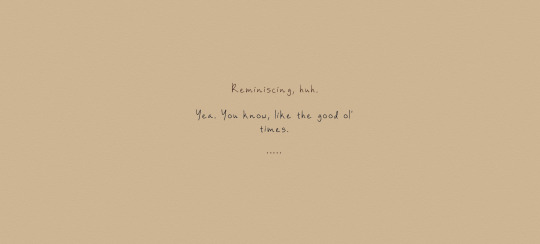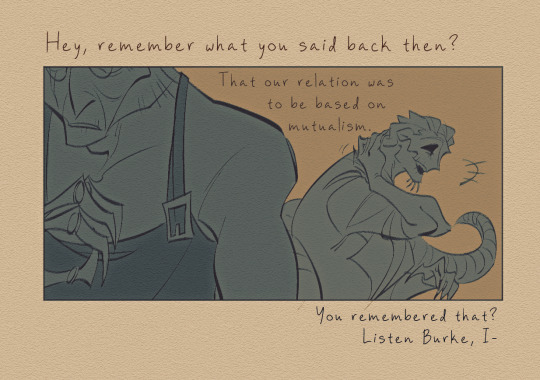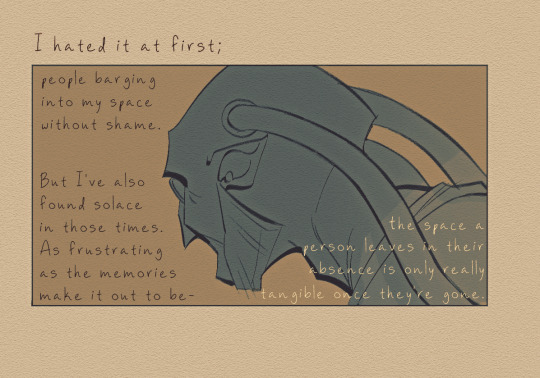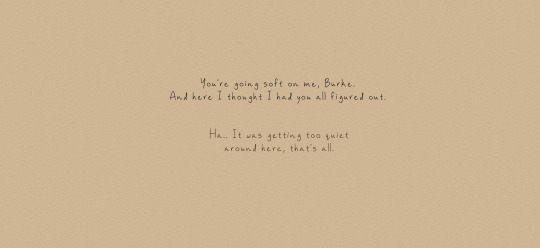#theres more to the latter part that i wanted to touch upon but balancing that along w enjoyment was difficult so went for a shorter route
Photo









The symbiotic relation between you and me
(part 1)
#theyre friends ur honor#idv#idv luchino#idv burke#identity v#idv fanart#idv evil reptilian#idv mad eyes#luchino diruse#burke lapadura#brohemeart#theres more to the latter part that i wanted to touch upon but balancing that along w enjoyment was difficult so went for a shorter route#but a lot of this is based on hcs between pom and me about luchinos relation to his old coworkers and burkes strained relation with bane#(at the time; theyre working through it)#luchinos presence rlly helped burke out a lot during those times even if he wont fully admit it#and vice versa#theyre both lonely in different ways#the realization that burke has come to see him as a good friend and how much those words coming from him mean#essentially the lizard man brings peepaw out of his shell and the peepaw gives the lizard emotional whammy
338 notes
·
View notes
Text
We need to talk about culture appropriation: why Lionel Shriver’s speech touched a nerve
Is it OK for white scribes to take on a black spokesperson? The assert that followed the American novelists address in Brisbane has shed new light on one of cultures hottest debates one that has hundreds of years of backstory and has sounded through literature, rap, stone and Hollywood movies
Lionel Shriver knew she was going to annoy beings. Inviting a renowned iconoclast to speak about community and belonging is like expecting a great grey shark to balance a beach ball on its nose, she articulated. She then used her keynote speech at the Brisbane columnists festival to tear into the debate that novelists most particularly grey writers are guilty of cultural appropriation by writing from the point of view of references from other culture backgrounds.
Referring to occurrences in which members of student authority at an American university faced impeachment after attended a tequila party wearing sombreros, and reports of a ban on a Mexican eatery from making out sombreros, the author of We Necessity to Talk About Kevin announced: The moral of the sombrero scandals is clear: youre not supposed to try on other people hats . Yet thats what were paid to time, isnt it? Step into other folks shoes, and try on their hats.
The response was instant. Sudanese-born Australian social activist Yassmin Abdel-Magied, who was attending the event, walked out and then rapidly wrote a comment part which was contended that Shrivers speech was a celebration of the unfettered exploitation of the experiences of others, for the purposes of the guise of fiction.
The argument is one of the most parted yet in a conversation that has a long record across literature, music, arts and rendition. While story might be the catalyst for this discussion, in the eyes of Abdel-Magied and others the issues are deeply rooted in real-world politics and a long history.
The image of the blackface singer creator of 1830s America the lily-white musician decorated up to look like a caricature of an African-American person and play-act comic skits is perhaps the most oft-invoked illustration of culture appropriation from record. The ethnic dynamic of minstrelsy was complex it was performed by African-American and Anglo actors alike but while African-American performers often sought to gain fiscal insurance from these best practices and in some cases use their scaffold to counter negative public stereotypes of themselves, white-hot performers reinforced those stereotypes. This produced within a society which continues to be has not been able to abolished bondage, and in which the political ability dynamic was very much racialized. As the civil right crusade thrived, so did criticism of white people attempting to exploit the pictures and events of people of colour for social and financial gain.
This pattern is recurred of all the countries, particularly in places that experienced colonisation and slavery, such as India, Australia and South Africa. As students, creators, activists and writers of emblazon fought to gain access to mainly grey institutions and public seats, and gained visibility in the cultural globule, they began to criticise the inaccurate images of themselves they construed created by and for the profit of others.
The issue has been heavily explored within the establishments but has reaped momentum in popular culture over the past decade. It underpins criticism of, among other things, Iggy Azaleas sonic blackness, Coldplays myopic construction of India in their music videos, and Miley Cyruss dance moves. Director Cameron Crowe lately apologised for casting Anglo-American actor Emma Stone as a part-Asian reputation in the 2015 movie Aloha not the first time a grey performer has been thrown to play a reputation from a different ethnic background in mainstream cinema. The proof has been assisted particularly by the feminist parish focus on intersectionality crudely the idea that discrimination takes on different forms depending on the hasten, class and/ or gender of the person or persons subject to discrimination.
The charge of culture appropriation is not confined to fiction, but at the moment thats perhaps the most heatedly raced terrain . In March, Harry Potter author JK Rowling was accused of proper the living institution of a marginalised people after a tale produced to her Pottermore website drew upon Navajo narratives about skinwalkers. Shriver herself mentioned the case of vehicles of grey British scribe Chris Cleave, whose novel The Other Hand is partly narrated by the character of a teenage Nigerian girl. In principle, I admire his firmnes, Shriver replied. She then went on to item reviewer Margot Kaminskis concerns that Cleave was manipulating the character, that he ought to be taking special care with representing its own experience that was not his own.
Shriver took aim at the proposal that an scribe should not use a reference they created for the service of a plot they saw. Of trend hes using them for his patch! she suggested. How could he not? They are his personas, to be operated at his caprice, to fulfil whatever purpose he cares to apply them to.
What borderlines around our own lives are we mandated to remain within? questioned Shriver. I would argue that any floor you are able to draw yours is yours to tell, and trying to push the boundaries of the authors its own experience is part of a fiction columnists job.
While it seems obvious that novelists of myth will endeavour to write from perspectives that are not their own, numerous writers of quality bicker there is a direct relationship between certain difficulties they face trying to make headway in the literary industry and the success of grey scribes who illustrate people of colour in their myth and who go on to build a successful literary profession off that. The difference between cultural illustration and cultural rights appropriation, by this logic, lies in the grey novelist telling storeys( and therefore taking producing possibilities) that would be better suited to a novelist of colour.
Some writers argue that it works in reverse, more. In an phenomenon for the Guardian in November last year, Booker Prize-winning author Marlon James told publishers too often pander to the white-hot wife( the majority of members of the book-buying public ), making writers of colouring to do the same. In a Facebook post responding to novelist Claire Vaye Watkins widely circulated essay On Pandering, James used to say the kind of storey favoured by publishers and bestows committees abode suburban white woman in the middle of ennui knowledge keenly observed epiphany pushed columnists of colour into literary conformity for fear of losing out on a journal deal.
Speaking to Guardian Australia, Indigenous Australian author and Miles Franklin winner Kim Scott adds its crucial to listen to the expressions of marginalised people who may not be given enough space to tell their own floors. Fibs are provides; theyre about reform and opening up interior macrocosms in the interests of expanding the shared nature and the common sense of community. So if theres many articulations telling we need more of us addressing our tales, from wherever theyre saying that, then that needs to be listened to.
Omar Musa, the Malaysian-Australian poet, rapper and novelist, told Guardian Australia: There is a history of stereotypes being continued by lily-white the authors and very, exceedingly reductive narrations. Beings are just generally much more cautious of that.
Musa supposes grey scribes should read, support and promote the operational activities of the novelists of emblazon before attempting to encroach on that cavity themselves, if that is something they want to do. But he admits he experiences the issue difficult; the suggestion that writers shouldnt move outside the boundaries of their own experiences comes into direct conflict with what he sees as the purpose of fiction: to empathise with and understand other families lives.
If youre going to write from someone elses perspective, Musa says, its important to shun stereotypes, especially if you want to move the specific characteristics rich and flawed as a good character should be.
Australian columnist Maxine Beneba Clarke. There are two schools of thought about[ culture appropriation] I dont know what the answer is but I can understand both views. Photograph: Nicholas Walton-Healey
Musa has his own experience of writing across the cultural subdivide. His first novel, Here Come The Dogs,was told from the perspective of a reference with a Samoan background. Musa answers consenting criticism is a crucial part of this process: There will be people who will tell you that maybe you didnt quite get this right, and you just have to cop that flack.
Maxine Beneba Clarke is an Australian-based novelist of African-Caribbean descent. Her memoir The Hate Race was prompted by a flow of racial insult; her accumulation of short narratives, Foreign Soil, was published to great acclaim after she won the Victorian Premiers Literary award for anunpublished manuscript in 2013. I think there are two situations in which Ive written outside of the African diaspora, she mentions. In both cases the latter are parts of short fiction and the process of writing them took several years, simply because of that consultation.
Beneba Clarke conceives consultation is all-important, but so is examining your own impulse to write from the perspective of another. What does it mean to be a writer “whos not” national minorities writer and wanting to change your literature? How do you do that? I think that was the opportunity for conversation that was missed[ in Shrivers speech] … How do we feel about writing each others stories and how do we go about it? Whats the respectful practice to go about it?
In some ways it comes down to personal ethics, she answers. Whether you feel you are doing no damage; whether you feel you are doing it sensitively; and, I believe, whether the publisher or the reader been agreed that you have done it sensitively.
Helen Young from the University of Sydney English department speaks fiction can have a very real impact on marginalised people. Individual journals have an impact on individual lives, but representation overall composes a seat and an environment in which people can feel like its OK to be who they are.
The politics of representation is a huge question in the science fiction and fantasy worlds very, speaks Young. This was exemplified by the recent expeditions against a comprehended leftwing bias in the Hugo gifts, in which disgruntled rightwing science fiction and fantasy columnists bickered the awards were being diminished by what the hell is experienced as the tendency of voters to opt studies simply about racial prejudice and exploitation and the like over traditional swashbuckling adventures.
Referring to the JK Rowling occurrence, Young suggests precisely because imagination is often to be considered as escapist, doesnt symbolize those stories dont stuff, or that authors should not treat different sources of their brainchild with respect. Theyre still the lived, hallowed narrations of living cultures, she supposes. Theyre the beliefs of real parties. So if from a western view you go, oh well, its just myth, I can do whatever I like with it, thats a problem.
Kate Grenville said she find writing Indigenous attributes was beyond her when she wrote The Secret River. Image: Sarah Lee for the Guardian
In some respects, the dirt seems to be changing. When Kate Grenville wrote her highly acclaimed historic romance about colonial Australia, The Secret River, in 2005, she shunned writing from the standpoint of Indigenous characters because she felt it was beyond her. Speaking to Ramona Koval on ABC radio, she alleged: What I didnt want to do was step into the heads of any of the Aboriginal attributes. I think that kind of appropriation … theres been too much of that in our writing. In her tale The Lieutenant, the sequel to The Secret River, nonetheless, Grenville did go into outlining more rounded Indigenous reputations, but only after deep and careful involvement with the historical records upon which her characters were based.
All the writers who spoke to Guardian Australia say they believe that considering the question of cultural appropriation is decisive, but the tenor of that discussion matters. They say that making a mockery of marginalised peoples concerns about image and appropriation does not constitute a constructive debate.
Scott, who has previously suggested a postponement on grey columnists used to describe Indigenous Australia, speaks lily-white columnists could use fiction itself to explore the tension about representation. Even the desire to occupy the consciousness of the other, that can be explored in story.
For Musa, the transformation needs to go beyond volumes: You probably cant have a change in literary culture without a change in the whole culture of the two countries, he says.
On the question of progress, in Australia at least, Beneba Clarke replies: “Theres” two institutions of was just thinking about this: that Australian literature is not diverse enough for Anglo-Australian novelists to be even considering writing from other cultures, and the other school of thought is, well, how do we change literature then, given that most of our writers are Anglo-Australian? Are we locking ourselves into an inevitably whitewashed world of literature?
And I dont really subscribe to either thought; I dont know what the answer is but I can understand both positions. But I think what I perfectly cant understand is disregard for any kind of consultation and an inability to understand when people of colour are outraged.
Such articles has been amended to clarify that the Hugo awardings are voted on by the public.
Read more: www.theguardian.com
The post We need to talk about culture appropriation: why Lionel Shriver’s speech touched a nerve appeared first on caredogstips.com.
from WordPress http://ift.tt/2ueIEY1
via IFTTT
0 notes